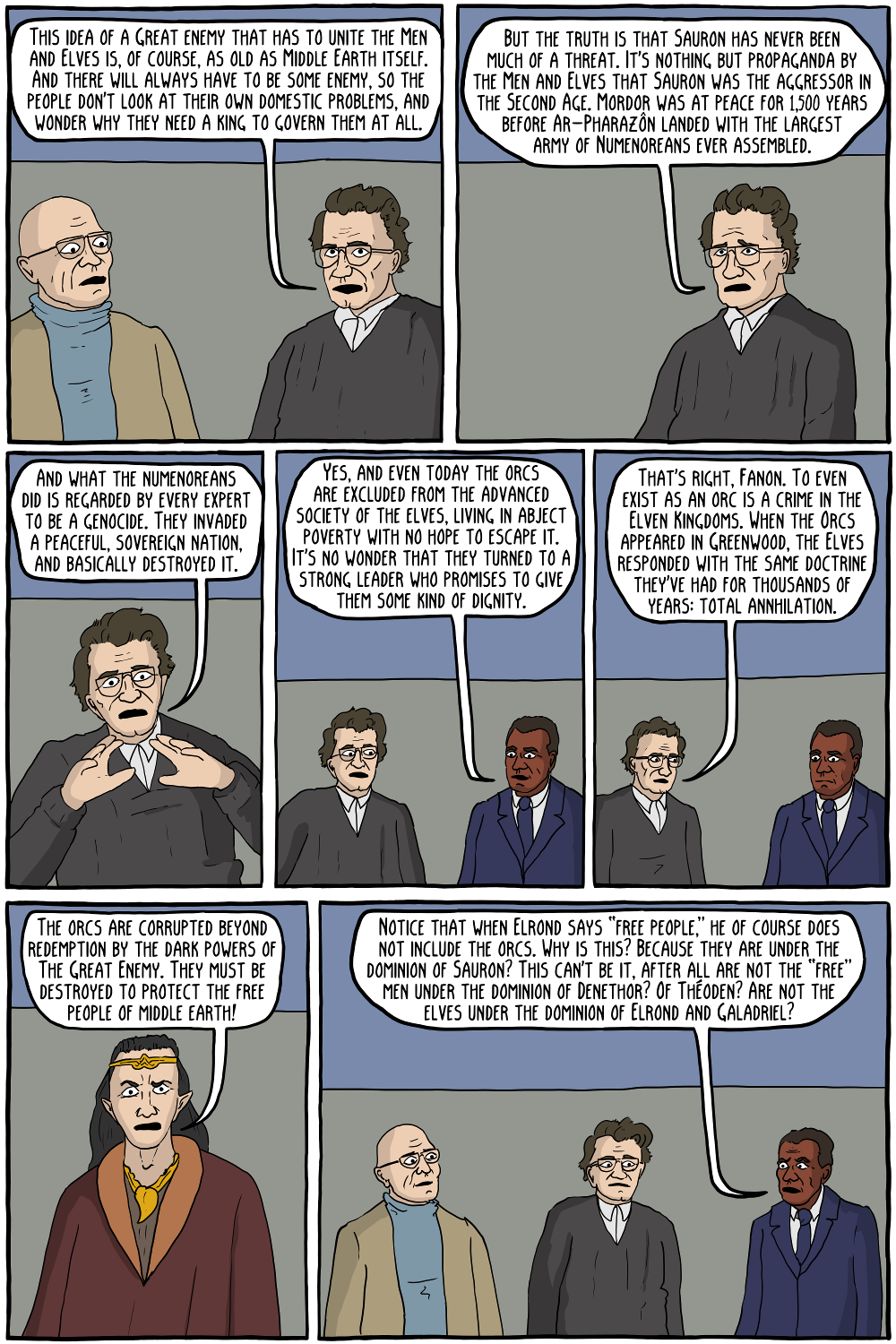This is a new idea I'm trying out -- I'm going to read Science Fiction written from about 1930 to about 1970 (when the Second Wave more or less began) and critique it for your reading pleasure.
Some of these books will be written by women. But I have to be able to access copies of the texts, and science fiction written by women before, well, 2010 or so, all too often is allowed to go out of print. So a larger percentage will be written by men.
I'm not going for the low-hanging fruit. These will (almost all of them) be books that have won critical acclaim, and even awards. I imagine they will all supply lots of fertile ground for our critical pleasure, though.
We'll be starting with
Brain Wave, by Poul Anderson, published in 1954. This book starts with the premise of a uplift, if you know the term, for every creature with a brain that possesses a brain. An uplift is a massive gain in intelligence. There's some sciency stuff about how the uplift occurs (lots of sciency stuff in this book), which seems fairly handwavium to me.
I've never read any Poul Anderson before, so I'm new to his writing. According to Wikipedia, he started as a liberal and became a libertarian/conservative in his later years. He seems to have written a heap of SF adventure novels, though this isn't one of them.
Chapter One:
This is an effective chapter. Anderson gives us several vingettes, ranging from a rabbit in a trap to a 10 year old kid, of beings whose intelligence is increasing rapidly. The rabbit figures out how to escape from the trap; the kid invents calculus. We're interested.
Chapter Two:
More vingettes, but we focus on the main character, a physicist named Peter Corinth. He suddenly understands how to solve a major problem that has been plaguing him. He works for the Rossman Institute, which seems to be an NGO of sorts, dedicated to solving technological problems, with the aim of helping industry. (Rossman's industry, mainly.) Cornith has been working on a way to analyze the structures of crystals. He explains all this to his wife, Sheila, in tedious detail.
The wife, Sheila, like all the women in this book, makes me wince. Sheila is -- at least before the change -- stupid. Sweet and pretty, but dumb as a rock. Why has Peter Corinth, who is a certified genius, who worked on the Manhattan project, who makes his living doing super-genius physics, why has he married someone who is just barely bright enough to wash dishes?
I mean, I guess because women are all stupid, so what else was he going to do?
In this chapter, we get interplay between Peter and Sheila, in which she demonstrates that she knows nothing about Greek mythology, and worships Peter, though she doesn't understand a single thing he's saying.
As for Peter, he's very fond of his stupid wife:
She was kind and merry and beautiful, and she could cook -- but she was nothing of an intellectual....He had sometimes thought she lived in a child's world, with nothing very well known, but all of it bright and strange.
We get Sheila's point of view after Peter leaves for work. She's delighted to be an "ordinary" housewife.
Her friends before had always been ready for a good laugh at the shibboleth-ridden boredom that was bourgeois existence, but when you got right down to it, they had only traded one routine and one set of catchwords for another, and seemed to have lost something of reality in the bargain.
This is Sheila after she's been uplifted, and she immediately stops and wonders why she's thinking such complex things. So not like her! She starts to sit down a read a mystery novel (now that the dishes are done), but then frowns and goes to pick up a "real" book instead, a well-worn one that belongs to Pete --
Lucky Jim.
Sheila sets the tone for the (very few) other women we're going to meet. Even the single working woman we encounter, Helga, who works at the Rossman Institute, isn't a scientist. She's a secretary. Useful, but only as a support for the
real people men.
First Pete Corinth has to encounter our other main character, Felix Mandelbaum (it's nice to see a Jew), in the elevator. Felix has also figured out a difficult problem, though his has to do with how to organize labor unions. They note this odd coincidence, and then separate as they leave the building.
Pete rides the subway to work at the Rossman Institute, meanwhile ruminating over his past -- his work on the Manhattan Project, his useless time trying to organize scientists after the way, his brief period in academia. What's the point, he thinks, and then, like Sheila, wonders why he's thinking all this.
He also thinks about the Rossman Institute, and how it's the only way to get science done. Governments and universities can't do science, Pete knows: the former because governments interfere with scientists and the latter because of all the politics and back-biting. (The government seemed to have done science with the Manhattan Project, but okay.)
The elevator man in the Institute is also uplifted. He and Pete have a conversation which leads to Pete suggesting the elevator man should go back to college.
Pete works in his lab. He gets a call from Lewis, who has noticed something strange in his lab. They go to lunch to talk about it, and Helga shows up.
She was a tall, rangy, handsome woman, her long blonde hair drawn tightly around her poised head, but something in her manner -- an impersonal energy, an aloofness, perhaps only the unfeminine crispness of speech and dress -- made her less attractive than she could have been.
Worse, we soon find out that Helga
can't keep a man. Horrors! Not only
not as attractive to men as she could be, she also has not been able to
marry. What a terrible fate!
Helga tells them that the institute's computer (yes, there's only one, this is 1954) isn't working right, and also that everyone in the institute has suddenly had "bright ideas" that they want to try out, via the computer and other technology, so everything is a mess.
Lewis tells them about his own lab, where he's finding that the neurones (nerve cells) he's been studying all of a sudden are reacting much faster than before.
This is the key to the uplift: electromagnetic transmitters transmit more quickly, including those in the brain. So everyone is thinking faster, and apparently this makes them more intelligent. (I'm not sure this is how it would work, but okay.) It will take our Heroes, despite their new brilliance, quite a while to reach this conclusion.
Chapter Three
We're on a farm, with one of the characters from Chapter One -- Archie Brock, who was a mentally-challenged farmhand before the uplift. Like Lennie from
Mice and Men, who he seems to have been modeled on, he was just bright enough to work at manual labor so long as he had someone telling him exactly what to do.
The person telling him what to do is Mr. Rossman, the one who funds the Rossman Institute.
Here on the farm, all is chaos. The chickens, pigs, horses, and other livestock have all gotten smarter, and they are using their intelligence to escape from their pens and (in the case of the horses and pigs) rebel against their oppression.
The dog is still loyal, though.
We learn that Mr. Rossman lives alone of the farm, since his daughters have all married and his wife is dead. We also learn that the wife of one of the other farmhands washes and mends Archie's clothing. Women live to serve men.
Will the uplift cause women to become other than adjuncts to men? Will they, like the other livestock, rebel? I'm betting not, but maybe Anderson will surprise me.
Archie notes that his head feels funny. He figures out that he's getting smarter, just like the animals.
He could see how people would be scared if the animals started getting smarter. If they were really smart, would they keep on letting humans lock them up and work them and castrate them and skin and kill and eat them?
He goes to talk to Mr. Rossman, who tells him what's happening -- how everyone is getting smarter, and how the government is trying to keep that news from getting out, so that people won't panic. "They'll hang on to their stupidity to the very end in Washington," Rossman declares.
Rossman says he's heading to the institute, to see what they're learning about the event. Archie is afraid of being left alone on the farm, but he gets over it very quickly, and asks Rossman for a book. He thinks he can read it now.
This cheers Rossman up, and he takes Archie into the library to look for something simple-minded enough for Archie to read.
That's enough for today. So far, aside from the sexism and ableism, this is pretty good. I like Anderson's point that enhanced intelligence leads not to happiness but to existential despair. Archie gets happier (not yet, but soon), because he's been uplifted into normal intelligence; everyone else begins to suffer from anxiety, dread, and despair.
More soon!
 My book review of Fates and Furies by Christine Lucas is live at Strange Horizons. (Currently on sale for $3 from the publisher!)
My book review of Fates and Furies by Christine Lucas is live at Strange Horizons. (Currently on sale for $3 from the publisher!)

![The Heavens by [Newman, Sandra]](https://images-na.ssl-images-amazon.com/images/I/51GzuSVcpIL.jpg)







![Emergency Responder: "Philosophy Emergency Hotline, what is your emergency?"
Caller: "I'm at a dinner party and my friend is carrying on about how postmodern neo-marxists are corrupting our youth by teaching them that everything is as true as everything else."
Emergency Responder: "Okay, i need you to stay calm. Did you try explaining to him that Marxism is a modernist philosophy and is fundamentally at odds with postmodernism?"
Caller: "Yes, but he just said that both philosophies were against “Enlightenment Values”, so they are basically the same."
Emergency Responder: "Good god, we'll send a squadron right away."
[description]: Aristotle bursts down the door.
Aristotle: "We don't debate with people who haven't read a single book on the topic they want to debate!"
Aristotle, through the door: "Philosophy Swat Team, open up!"
PERSON: "Never! I just want a rational debate."
Aristotle: "You are under arrest for philosophical slander, strawmanning, bad faith arguments, and just generally being a dumbass."
PERSON: "Help! Censorship! I'm being censored because they are afraid of the truth."
Aristotle: "That's enough out of you, we are taking you downtown."
PERSON: "Wait, this isn't jail... it is just the library."
Aristotle: "Exactly. Now read a god damn book."](https://static.existentialcomics.com/comics/PhilosophyEmergency.png)
